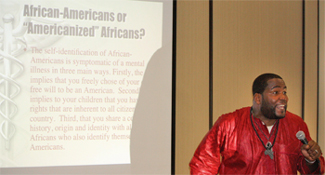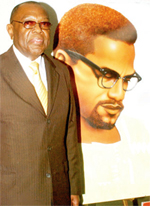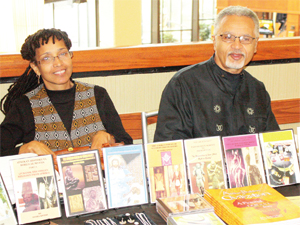Black holocaust conference remembers past, charts lessons for future
By Brian E. Muhammad -Contributing Writer- | Last updated: Nov 24, 2010 - 8:26:53 AMWhat's your opinion on this article?
 Dr. Umar Abdullah Johnson of Philadelphia delivers his presentation. Photo: Erick Muhammad |
Historians have documented the abduction and subsequent devastation of Black life, noting that the past violations still have far reaching impact well into the 21st Century.
On Nov. 19-21 an assortment of scholars and activists convened here for the 19th Black African Holocaust Conference to discuss the Black condition and advance solutions to counter the legacy of abuse.
In recent years, “the issues and the plight of Black people got marginalized and really camouflaged,” said Eric Ture Muhammad, the main conference organizer. He pointed to several significant events, including Hurricane Katrina and the shameful response from the U.S. government to provide emergency aid and help rebuild Black lives as examples of the modern Black holocaust.
 A. Akbar Muhammad Photo: Richard Shabazz |
Conference organizers explained that the purpose of the Black African Holocaust Conference was to bring healers, thinkers, scholars and community folks together in a forum where issues could be discussed and progressive solutions offered.
In workshops and presentations a myriad of views were shared about current methods employed against Blacks and strategies to counter the attacks. Participants and presenters dealt with the prison industrial complex; education; physical, mental and spiritual health, economics, environmental racism and other issues.
Over the course of several sessions presenters agreed that the Black experience in America has largely been about genocide—the systematic attempt to destroy Blacks as a people.
“We are in a period of mass extermination. We are no longer being oppressed, repressed, or suppressed—we are being exterminated,” said Dr. Umar Abdullah Johnson, nationally certified school psychologist. Dr. Johnson conducted a workshop on “Post Traumatic Slave Disorder” and outlined how public mis-education is used as a mental killing field and how some Black independent schools that need public funding have fallen under the influence of the oppressor.
Speakers outlined the critical need for Blacks to tell their own story, come to grips with past violations and recognize that the Black Holocaust continues.
It's nothing for European Jews to keep the sights and images of their holocaust before the eyes of the world and cry “never again,” remarked Ashra Kwesi, an historian and Egyptologist.
However as the Jews speak of a holocaust in the context of a past event, Blacks speak of the holocaust in the present tense, presenters said.
“When Jews talk about the holocaust, they talk about what was and it should never happen again,” observed longtime activist Pam Africa, who is based in Philadelphia. “We are living a holocaust; we are living under terrorism. Their people are not being shot down in the streets every day; they don't have the housing problem, the economic problems.”
Furthermore, Dr. Johnson added, the Black Holocaust has become self-sustaining. “The chief goal of slavery was to make the victim a willing accomplice in their own extermination,” Dr. Johnson said.
A modern day slave system perpetrated in the form of the prison industrial complex is one holocaust method, said participants in a workshop titled “Is Mass Incarceration the New Jim Crow?”
 Ashra Kwesi (r) with his wife Merira in the vending area. Photo: Erick Muhammad |
In most states ex-offenders, often tied to drug crimes, are not eligible for food stamps and other kinds of benefits, including grants for education, she said.
“Slavery, Jim Crow, mass incarceration is the same thing,” Ms. Taifa said. Where some kinds of discrimination supposedly ended with Jim Crow, the justice system has become the legal way to continue the same violations of Black life, she argued.
Ms. Taifa said a major part of the solution is tying the international arena into the work of uplifting Black people in the United States.
“We can't keep things within the confines of this country; we must internationalize our struggle,” Ms. Taifa said.
There are stronger legal conventions in international law pertaining to discrimination than domestic laws and these international standards can be used to seek justice for Black people, she said.
Mr. Kwesi agreed current strategy must include a global reach to expand the view beyond the borders of America. It is part of “holistically” looking at who Blacks are because the perpetrators of the Black Holocaust never intended a reconnection to Africa, he said.
“When we leave America we are actually (like) runaway slaves because mentally we are not supposed to even think like that,” said Mr. Kwesi.
Another critical area covered by the conference was a “Health is Wealth” panel where insights were shared on how to counter the assault on Black life through taking charge of one's health.
“We are a part of a legacy of whole people, but we are not coming from a whole place. So what we have to do is address spirit, is address what did our ancestors do? What did our grandmothers do when there were issues, because they went through those holocausts and we are still travelling through that,” advised Dr. Siti Opio.
Author and publisher Supreme Understanding emphasized awareness and education about health and the onslaught Black people face.
“The current crises in health for original people in America and worldwide today are a byproduct of a global system of oppression that stems from White supremacy and with that understanding we can proceed to develop responses,” said Supreme Understanding.
Increasing the Black Economic IQ was the message from twin brothers Dwayne and Daryl Mooney, sons of comedian Paul Mooney. The twins gave a high energy presentation about the necessity of building wealth and knowing the difference between financial literacy and financial IQ. The Mooney's encouraged listeners to become involved in investing and developing “passive” streams of income to free them from economic dependency—another aspect of the Black Holocaust. The brothers also said Black people should trade in international markets just as banks do using what the average person deposits.
The Black African Holocaust conference plans to convene sessions in several cities to build on solutions and ideas coming out of the weekend conference.
A tribute dinner honoring socially conscious comedians Paul Mooney and Dick Gregory and Elizabeth Omilami, the daughter of longtime civil rights activist Hosea Williams, who leads a program that feeds thousands of homeless people each week in Atlanta, was also held.
No comments:
Post a Comment